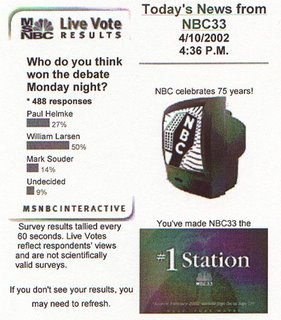Free Speech
Free speech is one of the most important rights we have. Federal courts as well as the Supreme Court of the United States have repeatedly up held free speech. EACS has suspended/fired a teacher for allowing an article on tolerance to be printed in the school newspaper. I truly believe that EACS is violating and infringing on free speech and I reference the Supreme Court Ruling of 1969 in “Tinker v. Des Moines Independent Community School District” “It can hardly be argued that either students or teachers shed their constitutional rights to freedom of speech or expression at the schoolhouse gate.”
There is here no evidence whatever of the editorial having interference, actual or nascent, with the schools' work or of collision with the rights of other students to be secure and to be let alone. Accordingly, this article does not concern speech or action that intrudes upon the work of the schools or the rights of other students.
In our system, undifferentiated fear or apprehension of disturbance is not enough to overcome the right to freedom of expression. Any departure from absolute regimentation may cause trouble. Any variation from the majority's opinion may inspire fear. Any word spoken, in class, in the lunchroom, or on the campus, that deviates from the views of another person may start an argument or cause a disturbance. But our Constitution says we must take this risk and our history says that it is this sort of hazardous freedom -- this kind of openness -- that is the basis of our national strength and of the independence and vigor of Americans who grow up and live in this relatively permissive, often disputatious, society.
In order for the State in the person of school officials to justify prohibition of a particular expression of opinion, it must be able to show that its action was caused by something more than a mere desire to avoid the discomfort and unpleasantness that always accompany an unpopular viewpoint. Certainly where there is no finding and no showing that engaging in the forbidden conduct would "materially and substantially interfere with the requirements of appropriate discipline in the operation of the school," the prohibition cannot be sustained. Burnside v. Byars, supra at 749.
Under our Constitution, free speech is not a right that is given only to be so circumscribed that it exists in principle, but not in fact. Freedom of expression would not truly exist if the right could be exercised only in an area that a benevolent government has provided as a safe haven for crackpots. The Constitution says that Congress (and the States) may not abridge the right to free speech. This provision means what it says. We properly read it to permit reasonable regulation of speech-connected activities in carefully restricted circumstances. But we do not confine the permissible exercise of First Amendment rights to a telephone booth or the four corners of a pamphlet, or to supervised and ordained discussion in a school classroom.



0 Comments:
Post a Comment
<< Home